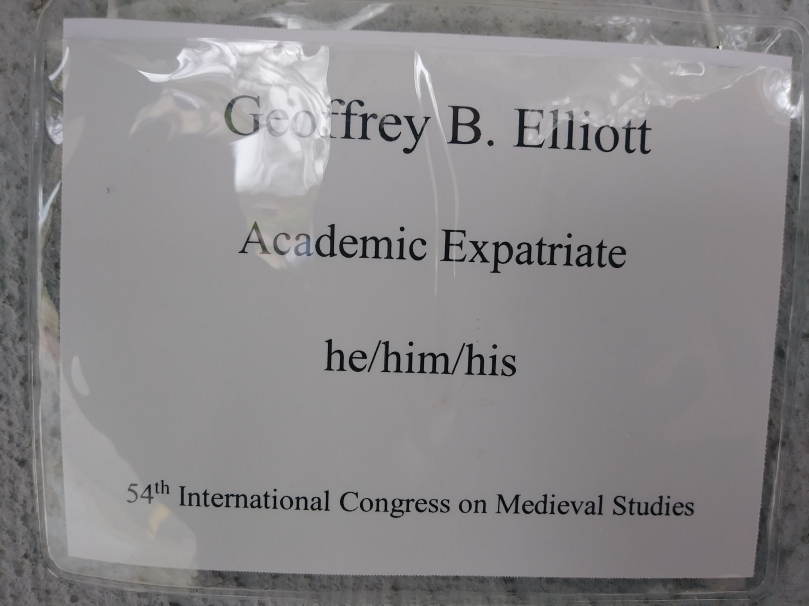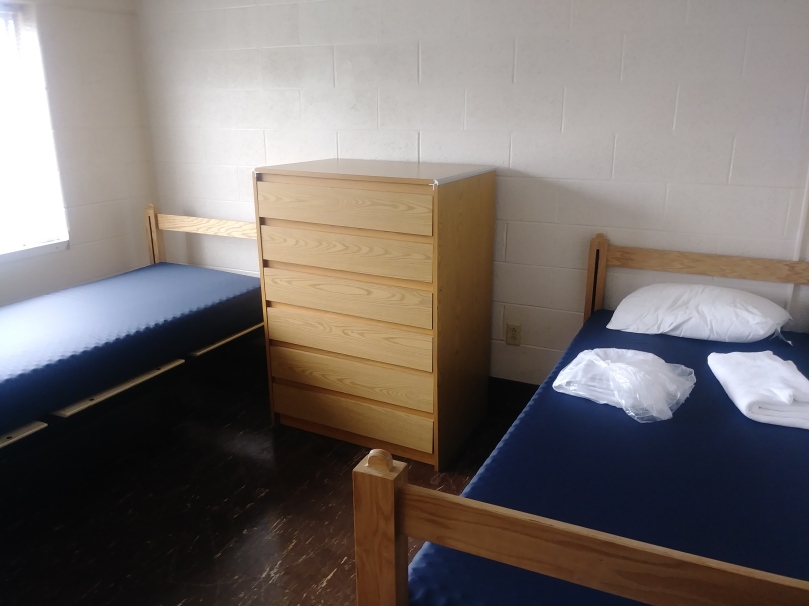Over the weekend just past, I was once again in Kalamazoo, Michigan, for the International Congress on Medieval Studies, hosted by Western Michigan University. Once again, attending was a good thing for me, even if I was only there for part of the proceedings (rather than the whole event, as I have generally been–though that has not been the case most recently). It was also good to have gotten done what I took a brief hiatus to get done, and I am looking forward to getting back to work at home and on the various projects that are represented in this webspace. But there are some things that I do need to address about the conference before I move on.

I still cannot take credit for the title, though, even if I might continue using it.
I could remark on the commonplaces of the Congress. Issues of accommodation and access deserve consideration, after all, even if I am not necessarily the best equipped or the best situated to offer that consideration. Yes, I can crack wise about the conditions of my room, shown in the relevant picture (which originally appeared on my Twitter feed, @GBElliottPhD), and I do note that there is some value for me, if perhaps less so for others, in being a bit removed from the comforts and convenience of my daily life. But I am also aware that things which serve as comforts and conveniences for me are much more important for others, and I am trying to be better about listening to scholars of differing abilities about such things.

Also important to note–because I am not about to get into the issue of comparing circumstances, and I have no desire to be taken as moving towards that issue at all–is the more-pronounced-than-usual whiteness of the Congress this time around. There was a boycott of it by a number of scholars, and I am sympathetic to it. (I was also not as aware of it as I perhaps should have been, for which I apologize.) What I read of the comments about it going into the Congress (which is less than I likely ought to have done, for which I apologize) suggested that one thing I could do to demonstrate support was to call attention to the issue in my own panels–and I believe I did so. In a business meeting I chaired, as well as in my paper presentation, I made explicit the need to do better with such things. For example, the conclusion of my presented paper:
Further study of other religious practices at work in medieval Europe than those commonly associated with medievalist tropes would also seem to be warranted, particularly as concerns depictions of in-milieu disadvantaged populations and their correspondences with real-world counterparts and analogues. Entirely too little has been done in that vein, with putatively mainstream audiences focusing more on themselves and those like them than upon respectful examination and appreciation of difference, and it has allowed rhetorics of ignorant hate to flourish entirely too much. It falls to further work on this project, and on any project, to work against such things with all possible vigor; I can hope that refinements to the current paper will serve that end.
I acknowledge that my backgrounds in racial and ethnic studies, in feminist studies, in gender studies more broadly, and in disability studies, as well as in many other areas of inquiry, are not as robust as could be imagined or hoped. The positions from which I have approached academe have shaped me in ways that have highlighted other issues that intersect with such fields but are not congruent with them, and I know I have had the privilege of looking at other things. I do not claim to have any particular expertise in them. But I can apply the expertise I have to at least point out the gaps in itself; I can refuse to pretend that my inexpertise with a thing means the thing is not worth expertise. No few humanities scholars complain of those outside the academic humanities ignoring the broad field because they do not work within it; how many of them will do the same thing with smaller areas of inquiry closer to them? I, at least, will try not to do so.
It is a small thing, I know, put against a large, large problem. But it is to be expected that the work I would do would be small; I am largely out of academe, an expatriate rather than an exile only in that I am allowed to return from time to time at gatherings such as the International Congress on Medieval Studies. I can hope that, in the coming years, others who have been here and would be here can well be here again–and I know that they can only be so, and should only be asked to be so, when they are treated with consideration and dignity. And I believe them when they tell me that they have not, even when and where I have not seen it.
[…] this point, I am back from my conference trip (about which I’ve remarked), and things are slowing down a bit for me. They are not slowed as much as would let me get started […]
LikeLike
[…] to discuss is an issue prevalent in the academic field I sought to enter (about which more here and here). That field, medieval studies, is currently grappling with its racist appropriations and […]
LikeLike
[…] here and elsewhere in this webspace), and every step I take into being an expatriate (here and here) or exile has felt a tearing-away. Doing as much as I did in pruning away the books and journals […]
LikeLike
[…] on Medieval Studies at Western Michigan University in Kalamazoo, Michigan (about which, see here and here). After some thought and consideration, and given the other work that I am doing, I […]
LikeLike
[…] on the campus of Western Michigan University in Kalamazoo, Michigan. I’ve done so once or twice before, I know, and I’ve commented about papers I’ve delivered there, such as this one. […]
LikeLike
[…] As was the case last year, but not in the years about which I have written in this webspace (2018, 2019, and 2020), my participation was virtual; as was not the case last year, but was in previous years, […]
LikeLike